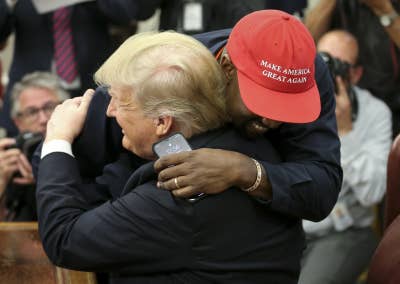
For anyone who’s spent even a few hours in the online fever swamps of the pro-Trump media, Kanye West’s Oval Office rant feels exhaustingly familiar. Holding court as the president beamed from the other side of the Resolute Desk, West delivered a lengthy monologue cribbed from the “Recommended Next” algorithm that kicks in at the end of any Jordan Peterson YouTube video. Trump, West proclaimed, was on a "hero's journey." The “Make America Great Again” hat he was wearing “made [him] feel like Superman.” There were hugs. It was the logical conclusion of a months-long saga: the red pilling of Kanye West.
How’d this happen? Is this real? Do we even care? West’s embrace of the MAGA life is, at this point, unsurprising. But his journey — from a politically disinterested nonvoter in 2016 to the giver of a prolonged pro-Trump speech onstage at Saturday Night Live a couple weeks ago — is crucial to understanding the enduring appeal of Trumpism and the MAGA movement.
Trump’s MAGA hat–wearing, “lock her up”–chanting crowd is often described as his political base, but even that doesn’t quite do justice to the intensity of devotion the Trump coalition feels for the president. #MAGA is the 20–30% who’ll never leave, regardless of the political effects a Trump presidency might have on them personally. It doesn’t matter if Trump’s tax cuts never really trickle down or if the administration’s tariffs put a hurt on the agricultural communities that show up to his rallies in dizzying numbers, clad in the red hats. Because, for many who show up, MAGA is about a sense of community over all else.
Whether it’s a Trump rally or the toxic /r/The_Donald subreddit, MAGA communities coalesce around the idea of being proud to be an outsider. It’s why Hillary Clinton’s “deplorable” remark became a rallying cry during the election. It’s a movement that relishes in turning criticism from ideological opponents into a badge of honor. Similarly, those who inhabit the MAGA world simply view confrontation and people taking offense to their actions as a byproduct of being right. It’s like driving 90 mph the wrong way down a one-way street and interpreting the honking and flailing arms of the other drivers as proof that they’re all just jealous you found the best route. This mindset allows for a particular brand of freedom: freedom from introspection, from ever having to say you’re wrong, and from ever admitting defeat.
It’s not surprising then that West, a lifelong contrarian, provocateur, and relentless self-promoter, found acceptance in this world. Despite being one of the most famous, sought-after people on the planet for the better part of two decades, West has always positioned himself as an outsider — for being unafraid to flaunt his ego or to call himself “the nucleus” of culture. Though Kanye has been at the center of modern popular culture, he’s frequently bemoaned a lack of acceptance — an inferiority complex that has strong Trumpian echoes. “When I do an interview in W magazine, and they take all these classist shots at me,” he told Jimmy Kimmel during a 2013 interview. “Because it’s not about racism anymore, it’s classist. … What they try to do is to say, ‘You’re a rapper and your girl is on a reality show, so you’re not up here with us. We’re old money.’”
Trump and the MAGA lifestyle also seem to offer a safe haven to some who’re reflexively distrustful of establishment politics. Infowars creator Alex Jones, for example, dedicated his career to a conspiratorial, nonpartisan distrust of every president from George H.W. Bush to Barack Obama. It wasn’t until Donald Trump that Jones endorsed a mainstream presidential candidate — similarly, no mainstream presidential candidate until Trump gave Jones or the Infowars audience the time of day. Kanye, while no Alex Jones, has been similarly outspoken and has publicly expressed his displeasure with commanders in chief during his infamous post-Katrina telethon speech and through a long-simmering feud with Obama. As with Jones, the always available Trump gave Kanye what he truly desired when he posed with him at Trump Tower as president-elect in 2016.

A movement organized around building a community of contrarians — those who feel aggrieved and disenfranchised, and who prioritize conflict and winning over all else — is quite literally tailor-made for the internet. And though it’s unclear exactly how Kanye was red-pilled (though lots of people are guessing), the rapper’s transformation helps explain why the internet has been such a powerful force for Trumpism. Kanye is, among other things, a creature of the modern internet. His penchant for sensationalism and reactionary commentary suggests he instinctively understands how algorithms and virality work; he’s a genius at igniting and sustaining news cycles. In other words, he’s an excellent troll with respect for others like him — and he has a mindset primed for tumbling down a rabbit hole of reactionary thought.
No comments:
Post a Comment